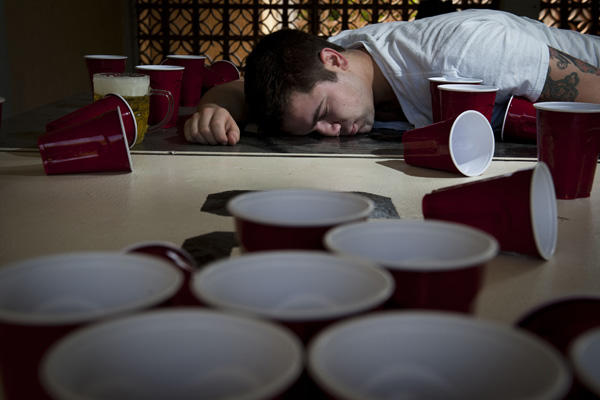Do you drink more than you should? Does someone in your family?
Both Veterans and their family members face many changes when returning or leaving the military. Many of these changes can pose challenges that lead to alcohol abuse.
"I had a [drinking] problem before I went into the service, but it was more dramatic when I got out," said Jerry, a Navy Veteran who served four years in Vietnam. He came home to his fiancée engaged to someone else and married another woman a year later. Though the breakup of his marriage was due to a "combination of a lot of things," Jerry's alcohol abuse was part of the problem. "Drinking was a factor in my not being able to have a close personal relationship," he said.
Recognizing a drinking problem is not always easy. Alcohol abusers are sometimes just thought of as "partiers." Unhealthy or dangerous drinking habits can include drinking every day or drinking too much at a time. These habits can lead to strained or ruined relationships, missed work, trouble keeping a job and difficulty finishing what you start. Some people who struggle with alcohol also have legal problems, such as drunk-driving arrests.
If you have a family, "alcohol abuse can have a profound impact, affecting the drinker's role as both parent and spouse," said Dr. Elizabeth Gifford, a VA psychologist. She is clinical coordinator for Quality Enhancement Research Initiative for Substance Use Disorders (SUDs) at the U.S. Department of Veterans Affairs Palo Alto Health Care System and Stanford University School of Medicine, Menlo Park, Calif.
"Returning Servicemembers often experience transitions re-entering their family role," said Gifford. "In addition, they can come back with chronic pain, Post Traumatic Stress Disorder, traumatic brain injury or chronic strain they experienced while overseas. When you add alcohol abuse to other issues these problems are magnified."
Going Sober
When VA doctors told Jerry he "wouldn't last more than six months" if he kept up his drinking, he decided to quit. After completing short-term treatment with VA, Jerry is now in a long-term treatment and transitional housing program for homeless men. He has been sober since October 31, 2011.
"A lot of the guys here are Veterans, so they know where you're coming from" said Jerry. "The camaraderie is great."
Screening tests are available on My HealtheVet. A four-question alcohol screening tool can give you an answer in less than a minute. A slightly longer questionnaire screens for abuse of alcohol and other substances, such as prescription and illegal drugs. All responses remain confidential. You are the only person who can access the information. It cannot be seen by anyone at VA or any other person.
Don't Go It Alone
"There are lots of resources at the VA for Veterans who misuse alcohol, and there will be increasing resources for people willing to be involved in the Veteran's treatment," said Gifford. For example, VA will be making an online course available for concerned family members and partners of Veterans with SUDs. The course will cover how to cope, avoid conflict and stay safe. Also it will help the Veteran get treatment and address related issues.
|
A study of Army soldiers screened three to four months after returning from deployment to Iraq showed that 27 percent met criteria for alcohol abuse and were at increased risk for related harmful behaviors, such as drinking and driving, and using illicit drugs. |
All VA care locations offer first-time alcohol screening and intervention for Veterans. Veterans also have access to SUD treatment. Veterans may choose to include family members in their treatment. A family member's involvement may range from a single visit to a course of treatment like Behavioral Couples Therapy. In therapy the family member attends a number of treatment sessions with the Veteran. To find a SUD program near you, visit the program locator or contact your local VA Medical Center and ask for the mental health clinic or OEF/OIF/OND coordinator.
If you or a family member wants to stop abusing alcohol, don't wait. VA can help.
Learn More
- Drinker's Check-up
Anonymous online tool to measure your drinking - My HealtheVet
Mental health portal with depression screening tool and learning center - Make the Connection
Veterans discuss their experiences with alcohol abus








